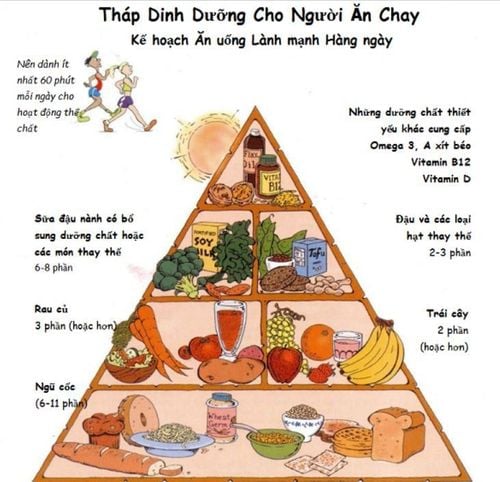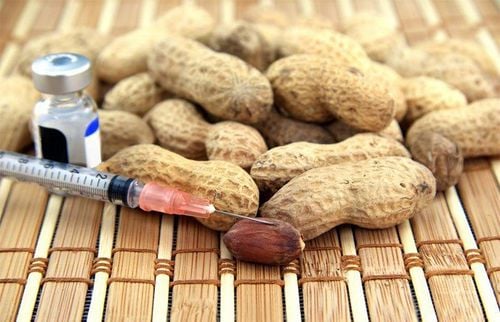This is an automatically translated article.
Nutrition pyramids for vegetarians often balance between nutritious food sources such as plant proteins, whole grains and healthy fats. It is not only good for health but also prevents the risk of chronic diseases. However, if a vegetarian diet is wrong, it can make the body deficient in essential nutrients, such as vitamin D, vitamin B12, calcium, zinc and magnesium, thereby leading to serious health consequences. .
1. What is a vegetarian diet?
A vegetarian diet is a diet of meat, poultry and fish. Many people choose to follow a vegetarian diet for personal or religious reasons, sometimes rooted in ethical issues, such as not killing animals. In addition, there are also people who decide to become vegetarian to protect the surrounding environment, because raising animals contributes to increased greenhouse gas emissions, climate change and other natural resources.
In fact, a healthy vegetarian diet is very diverse and each person can choose for themselves a vegetarian diet that is right for them. Here are the most popular types of vegetarian diets today, including:
Lacto-vegetarians: People who follow this type of vegetarian diet will not eat fish, meat, eggs and poultry, but there are can eat dairy products; Lacto-ovo vegetarian diet: With this vegetarian diet, you will not eat meat, poultry and fish, but dairy products and eggs are allowed; Ovo-vegetarian diet: Eggs are allowed, but meat, poultry, fish or dairy products are not allowed; Pescetarian Vegetarian Diet: Vegetarians can eat fish, sometimes dairy products or eggs, but are not allowed to eat meat and poultry in their daily meals; Vegan Diet: Vegetarians will have to completely eliminate animal products, meat, poultry, fish, eggs, dairy and honey; Flexible vegetarian diet: Mainly vegetarian combined with regular fish, meat and poultry.
2. Does a vegetarian diet provide health benefits?
In fact, many recent studies have proven that vegetarians often have better food quality than those who regularly eat meat. Specifically, the body of vegetarians is able to absorb many key nutrients, such as vitamin C, vitamin E, fiber and magnesium, among other health-promoting substances.
Tháp dinh dưỡng cho người ăn chay (tham khảo)
Here are the health benefits brought from following a vegetarian diet, including:
2.1 Supports effective weight loss The switch from a high-meat diet to a vegetarian diet is considered a an effective "strategy" for those who are looking to lose their weight. Experts have found that people who follow a vegetarian diet can lose about 2kg of weight within 18 weeks. In addition, some studies have also demonstrated that patients with type 2 diabetes can lose twice as much body weight when adopting a vegetarian diet instead of a low-calorie diet. Another study also showed that people who follow the vegetarian trend will have a lower body mass index (BMI - a measure of body fat based on a person's weight and height) than those who follow a vegetarian diet. people who are often omnivores.
2.2 Reduces Cancer Risk Researchers suggest that following a vegetarian diet can help you reduce risk factors for malignancies, including colon cancer, lung cancer, and lung cancer. breast, stomach or rectal cancer.
2.3 Helps stabilize the body's blood sugar The vegetarian diet is said to be able to maintain a reasonable and healthy blood sugar level in the body. This is especially beneficial for patients with type 2 diabetes. In addition, for the general population, following a vegetarian diet can help prevent diabetes risk through stabilization. long-term blood sugar control. The results of a new study have shown that a vegetarian diet can cut the risk of diabetes by more than half within 5 years.
2.4 Improve Cardiovascular Health A vegetarian diet is a way to help you strengthen your cardiovascular system, thereby preventing risk factors for heart disease. The reason why a vegetarian diet can reduce levels of bad cholesterol, total cholesterol and triglycerides - the leading factors that cause heart problems. Additionally, a vegetarian diet also reduces high blood pressure levels, another major risk factor for heart disease.

Ăn chay giúp cải thiện sức khỏe hệ tim mạch của người bệnh
3. Some potential side effects of a vegetarian diet on health
A vegetarian diet can be seen as a nutritious and healthy eating option. However, it can also have the potential to increase nutrient deficiencies in the body.
The reason why meat, fish and poultry can provide your body with a large amount of omega-3 fatty acids, protein and other important micronutrients, such as vitamin B12, selenium, iron and zinc. In addition, animal products such as eggs and milk are also rich in B vitamins, vitamin D and calcium. Therefore, eliminating meat and other animal products from the daily diet can lead to deficiencies in these essential nutrients.
Some studies have shown that people who follow a vegetarian diet have a higher risk of deficiencies in substances such as iron, protein, calcium, vitamin B12 and iodine than others. When the body is deficient in these important micronutrients, it can lead to conditions such as weakness, fatigue, impaired bone health, anemia and some thyroid problems.
To ensure adequate supply of nutrient groups for the body and compensate for potential deficiencies, vegetarians should add a variety of green vegetables, fresh fruits, plant protein sources, whole grains. whole grains, certain supplements, supplements, or multivitamins.
4. Is a vegan diet safe for pregnant women?
Pregnant and lactating women when following a vegan diet may be deprived of the necessary source of vitamin B12 for the body and reduce neurodevelopment in nursing infants. In addition, vegan diets also lead to calcium and vitamin D deficiencies, which affects bone demineralization in nursing women.
For children under 5 years of age who are raised on a vegetarian or vegan diet, the body's growth may be stunted due to vitamin B12, vitamin D deficiency and anemia. During the first 2 years of life, babies need DHA (omega-3 fatty acids) for optimal brain development. On the other hand, DHA is abundant in fish, so a vegetarian diet may prevent your baby's body from getting enough of this valuable nutrient.
5. Nutrition pyramid for vegetarians
Vegetarians should try to provide adequate nutrients such as calcium, protein, iron, riboflavin, zinc, vitamin D, vitamin B12, alpha-linolenic acid and zinc to the body. Here are some ways to help incorporate these nutrients into your vegetarian diet:
Iron: You can get iron through iron-fortified breakfast cereals, eggs, dried apricots, prunes, whole grains, and whole grains. soy products, beans, legumes, nuts or whole wheat bread; Protein: You can choose from vegetarian sources of protein such as tofu, tempeh, edamame, legumes, veggie burgers, nut butters, nuts, whole grains, eggs, amaranth; Zinc: Helps improve immune system function, commonly found in soy milk, eggs, vegetables, yogurt, cheese, nuts, zinc-fortified breakfast cereals, lentils, mushrooms, sprouts wheat; Calcium: Helps strengthen and build bones. You can ensure your body's calcium supply through nutritious foods such as yogurt, cheese, tofu, edamame beans, sesame tahini, almonds, almond milk, green vegetables; Riboflavin: Cow's milk, almonds, mushrooms, yogurt and soy milk are all excellent sources of riboflavin; Vitamin B12: You can get them through soy drinks, vegan meats and some breakfast cereals; Alpha-Linolenic Acid (O mega-3): Found in ground flaxseed, canola oil, flaxseed oil, walnut oil, walnuts, tofu or soybeans.

Người ăn chay có thể bổ sung đẩy đủ các chất thông qua nhiều loại thực phẩm khác nhau
6. Model Meal for Vegetarians
If you are starting to follow the lacto-ovo vegetarian diet, here is a model meal for you within a week:
Monday:
Breakfast: Fruit, oatmeal and flaxseed Lunch: Includes hummus wrapped in sweet potato fries and grilled veggies Dinner: Includes tofu sandwiches To get you started, here's a sample one-week meal plan for the lacto-ovo vegetarian diet. Tuesday:
Breakfast: scrambled eggs with tomatoes and mushrooms and garlic. Lunch: stuffed zucchini and feta cheese with tomato soup. Dinner: Basmati rice and chickpea curry Wednesday:
Breakfast: berries, chia seeds and Greek yogurt Lunch: Farro salad with cucumber, tomato and Feta cheese with spiced lentil soup . Dinner: eggplant with salad. Thursday:
Breakfast: fried tofu with onions, peppers and spinach Lunch: Burrito with brown rice, avocado, beans, vegetables and salsa. Dinner: Mixed veggie paella and side salad Friday:
Breakfast: Whole wheat toast with nutritional yeast and butter Lunch: Greek salad and tofu Dinner: Zucchini noodles and meat quinoa – black beans Saturday:
Breakfast: Smoothie with kale, banana, berries, almond milk and nut butter. Lunch: Red lentil burger and avocado salad Dinner: Flatbread and grilled vegetables with pesto sauce. Sunday:
Breakfast: Includes hash browns and kale Lunch: Deep-fried zucchini and bell peppers stuffed with tempeh beans. Dinner: Cauliflower rice and black bean tacos
Please dial HOTLINE for more information or register for an appointment HERE. Download MyVinmec app to make appointments faster and to manage your bookings easily.
Reference sources: webmd.com, healthline.com












